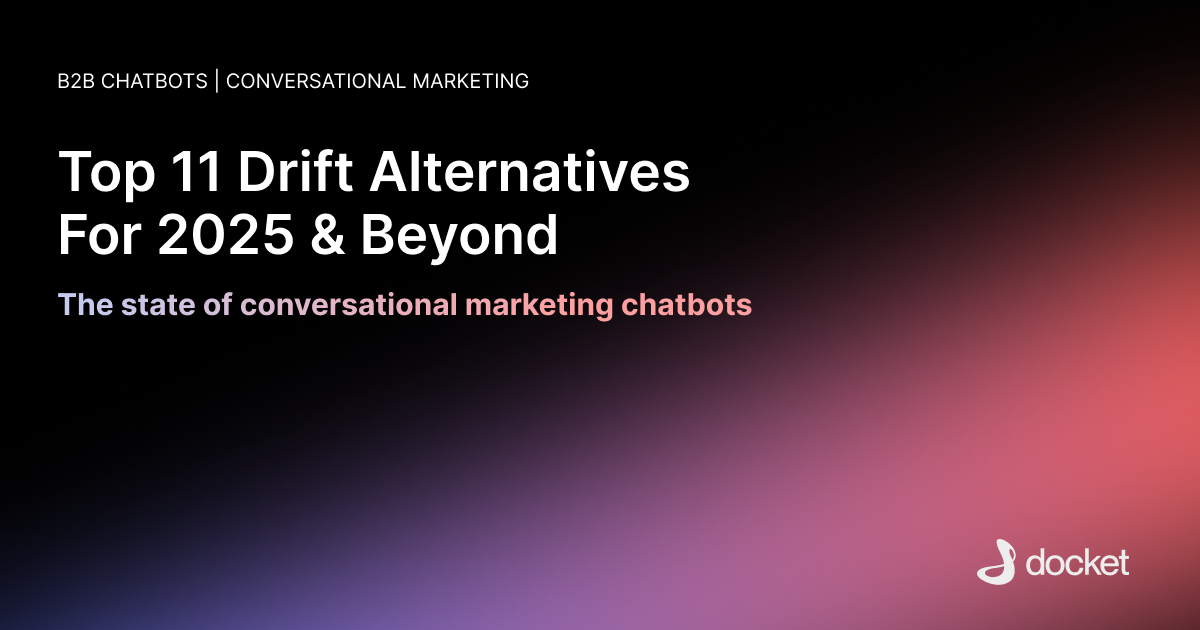Once a household name, now at the center of controversy – Salesloft took Drift offline early in September 2025 after multiple notable companies, including Salesforce and Cloudflare reported security breaches.
In other words, everyone’s looking for a new website chat software right n,ow and so should you, since there’s no better time to make the switch.
Drift might have stopped innovating after its Salesloft acquisition, but other players have taken website chat experiences to the next level over the past couple of years, with some AI-native products changing the game and being able to achieve capabilities that weren't even on Drift’s roadmap.
Here’s a list of the top 10 Drift alternatives for 2025 and beyond.
#1 Docket
Docket’s Marketing Agent is an autonomous, AI-native agent that learns everything about your solution with its Sales Knowledge LakeTM.
It then utilizes this knowledge to engage with website visitors and provide context-relevant answers to their questions through relevant slides. It also proactively asks qualifying questions, converts prospects into qualified leads, books meetings routes them to the right seller, and shares first-party intent insights it captures with its sellers.
Docket can converse with website visitors using human-like voice conversations or text-based chats. Teams that use Docket see 15% more meetings booked and a 15% increase in qualified pipeline generated. Eager to know more? Get a personalized demo here.
Differentiators
- AI-powered autonomous product education & selling for your entire website
- Answers that are grounded in your solution content and change history
- Automated CRM handoff for new leads and recurring conversations
Pros
- Plugs into your resources and automatically learns everything about your solution by itself, drastically reducing implementation time and costs.
- No need to set up rule-based workflows or decision trees, an AI agent guides prospects down the funnel based on goal-based instructions.
- Real-time sales conversations that do not need any human intervention
- Agent memory so it can resume conversations with recurring visitors
Cons
- Best fit for inbound PLG rather than outbound heavy motions
- Requires connecting product data and content sources for full value
Price
Custom pricing. Contact sales.
#2 Intercom
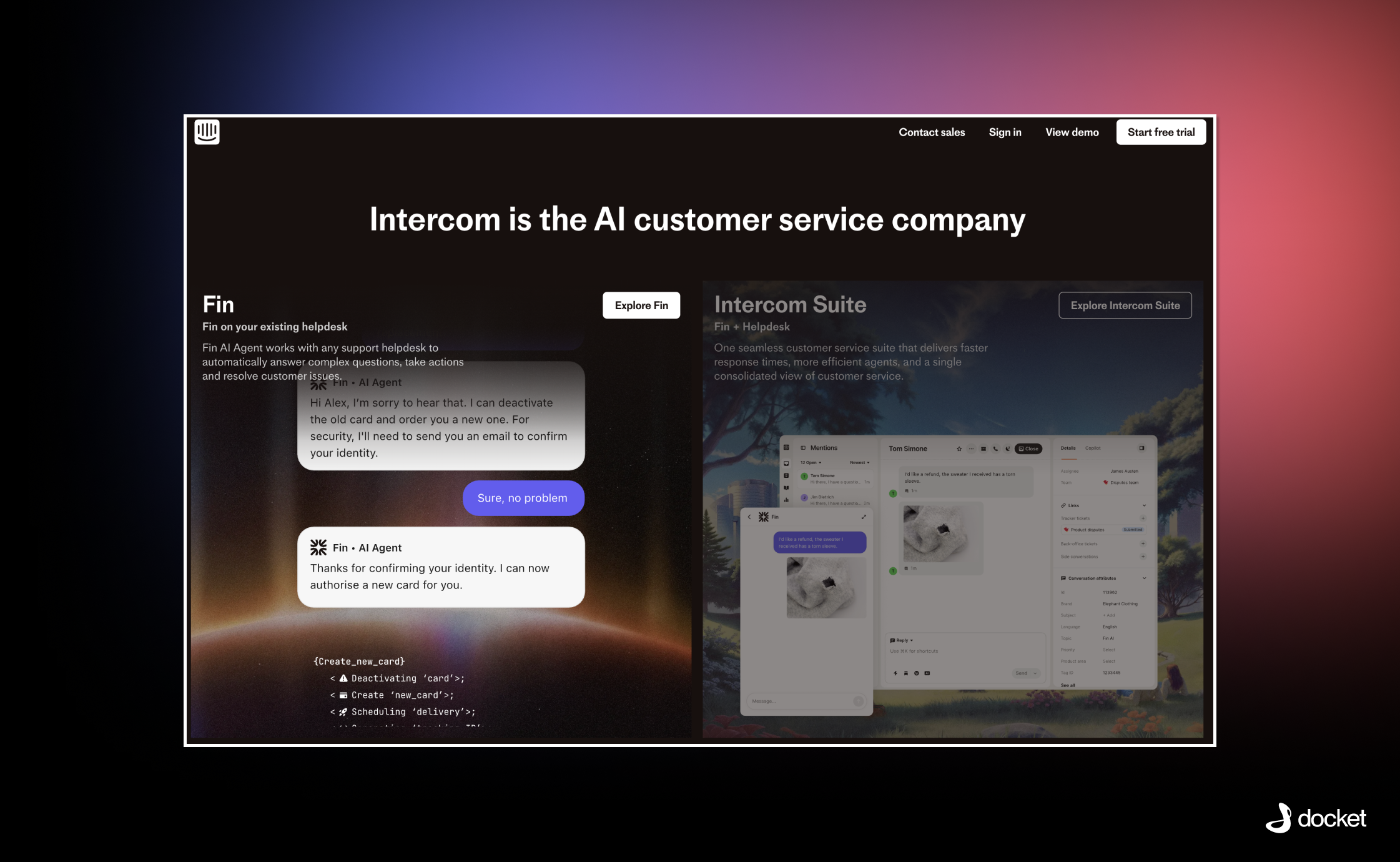
Intercom is a mature customer service suite that includes live chat, ticketing, and an AI agent named Fin. Teams use it to deflect common questions, keep a unified inbox, and escalate when needed. The platform has strong app integrations and clear add-ons if you need product tours, outbound messaging, or surveys.
Differentiators
- Fin is priced per resolution and can sit over Intercom or other help desks
- Seat-based tiers with modular add-ons
Pros
- Strong automation paired with a complete help desk
- Reliable app marketplace and enterprise controls
Cons
- Positioned primarily around support and customer service use cases and not to field website chats
- Costs can climb as usage and add-ons increase
- Can feel heavy if you only want site chat
Price
Seat pricing starts at $29 per seat per month, billed annually on the Essential plan. Advanced starts at $85 and Expert at $132. Fin is priced per AI resolution.
#3 HubSpot Live Chat

HubSpot Live Chat integrates directly with the free HubSpot CRM, enriching contact records with conversations by default. The chatbot builder, shared inbox, and routing are straightforward for small teams.
While there are limitations like the fact that it is text-only, it still follows old school rule-based decision trees, and doesn’t offer a lot of customizability, it works if you’re a small business that needs a chat agent on your website.
Differentiators
- Live chat and bots are available on the free CRM tier
- Native alignment with marketing and sales data
Pros
- No cost starting point that scales into the full HubSpot suite
- Clean user experience for both reps and managers
Cons
- Advanced features require paid hubs
- Not worth it if you are not a HubSpot shop
Price
Live chat is included with HubSpot’s free CRM, with paid tiers for advanced features.
#4 Qualified
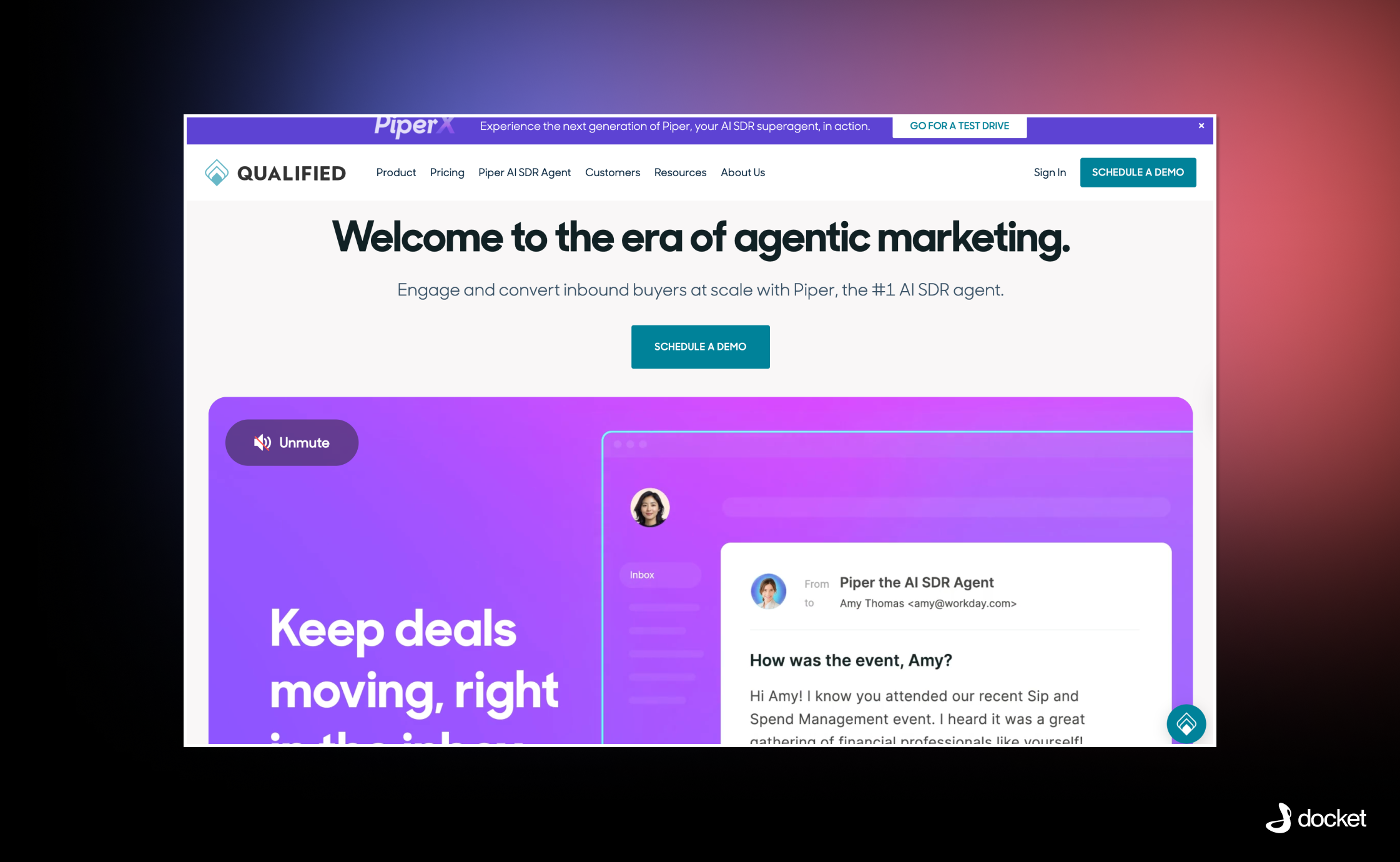
Qualified focuses on B2B teams that live in Salesforce and run account-based programs. It identifies visitors, qualifies them in real-time, and books meetings for your representatives. The workflows feel sales-first and map tightly to enterprise pipelines.
Differentiators
- Deep Salesforce integration and strong ABM targeting
- Meeting and routing flows tuned for named accounts
Pros
- Clear sales workflows that increase meeting rate
- Proven with enterprise SaaS teams
Cons
- Exorbitant pricing is built only with large enterprises in mind
- Only works if you already use Salesforce
Price
Custom pricing with a demo-led process.
#5 LiveChat

LiveChat is a focused live chat platform that values agent productivity and reporting. The widget is quick to install, and the operator app is polished. You can add related products, such as ChatBot and HelpDesk, from the same company if you want a broader suite.
Differentiators
- Predictable per-agent pricing with clear tiers
- Optional add-ons for bots, ticketing, and a knowledge base
Pros
- Easy setup with strong agent experience
- Reliable analytics and uptime
Cons
- A full help desk requires separate add-ons
- AI depth is improving, but still behind larger suites
Price
Starter from $20 per month billed annually, Team plan starts at $41, Business at $59. Monthly billing is $24, $49, or $69 per agent. ChatBot beings at $52 per month.
#6 Crisp
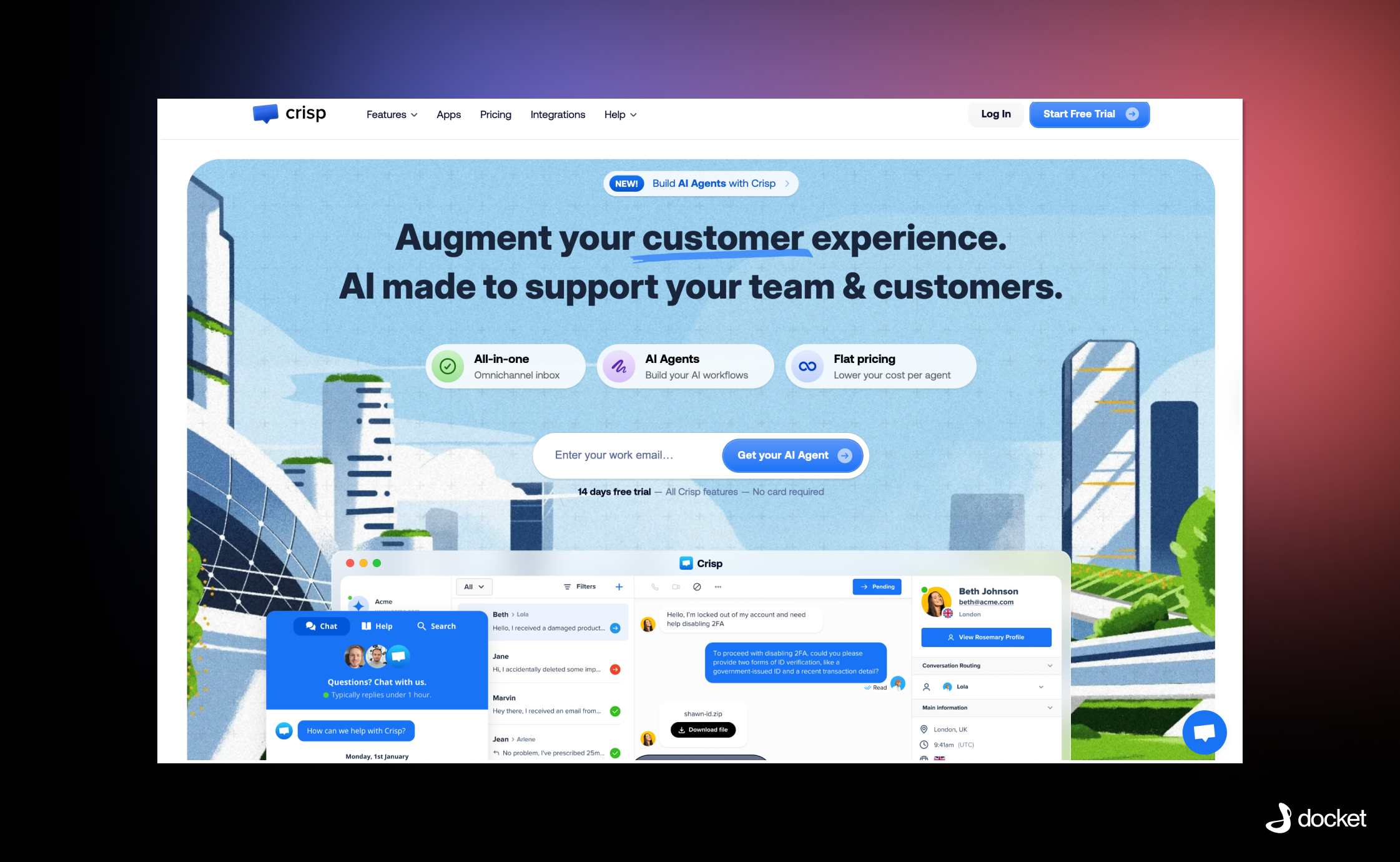
Crisp combines chat, a shared inbox, bots, and a knowledge base into a single workspace. The pricing is per workspace rather than purely per seat, which keeps costs predictable as you grow. It integrates well with e-commerce and social channels for omnichannel support.
Differentiators
- Flat workspace pricing with seats included
- Tiers that bundle AI and automation
Pros
- Cost control as conversation volume grows
- Functional ecommerce and social integrations
Cons
- Some advanced features require higher tiers
- Workspace model is less flexible for complex orgs
Price
Mini plan starts at $45, Essentials at $95, and Plus at $295 per workspace per month. Enterprise is custom.
#7 Zendesk Suite
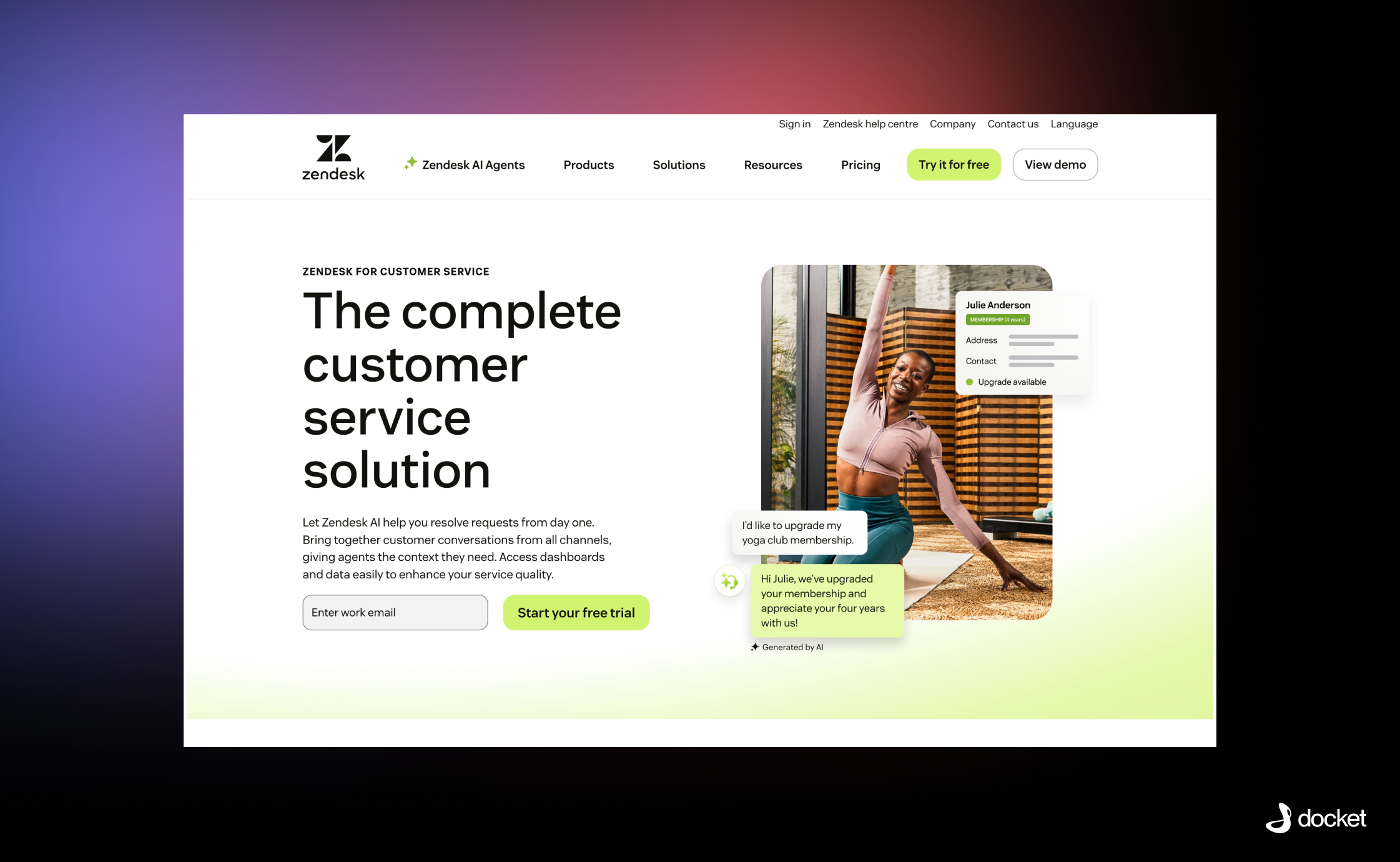
Zendesk is a complete customer service platform that spans messaging, live chat, ticketing, knowledge base, voice, QA, and workforce tools. Its AI features now touch agents, analytics, and content, which helps large teams scale. The marketplace and partner ecosystem are both extensive.
Differentiators
- Broad AI coverage across the suite
- Enterprise-grade security and compliance options
Pros
- Proven at large scale across many verticals
- Flexible workflows with strong reporting
Cons
- Built for customer service and support first
- Setup and configuration can be complex
- Overkill if you only need website chat
Price
Plans are marketed as starting from $55 per month.
#8 Freshchat by Freshworks
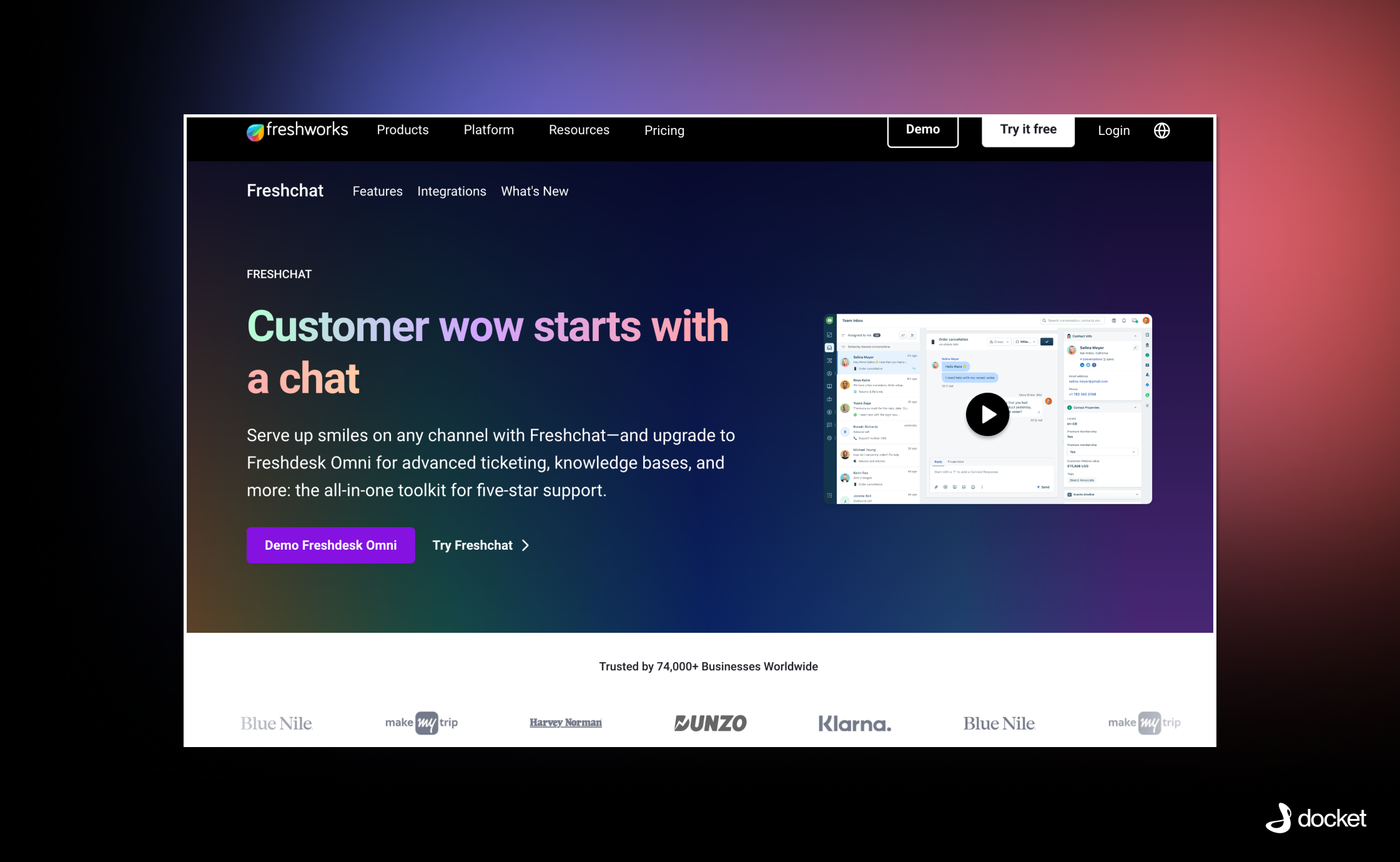
Freshchat provides modern site messaging, bots, and automation that integrate with Freshdesk and the broader Freshworks suite. Teams use it to resolve common issues quickly and keep a clean path to tickets or voice when needed. The interface is friendly and fast for small to midsize teams.
Differentiators
- Tight link to Freshdesk for ticketing and to other Freshworks tools
- Modern widget with templates and automation paths
Pros
- Quick time to value with a gentle learning curve
- Competitive entry price for growing teams
Cons
- Best experience if you adopt more of the Freshworks stack
- Packaging and feature names have changed over time
Price
Pricing starts at $19, with a free plan and an enterprise tier also available.
#9 Tidio
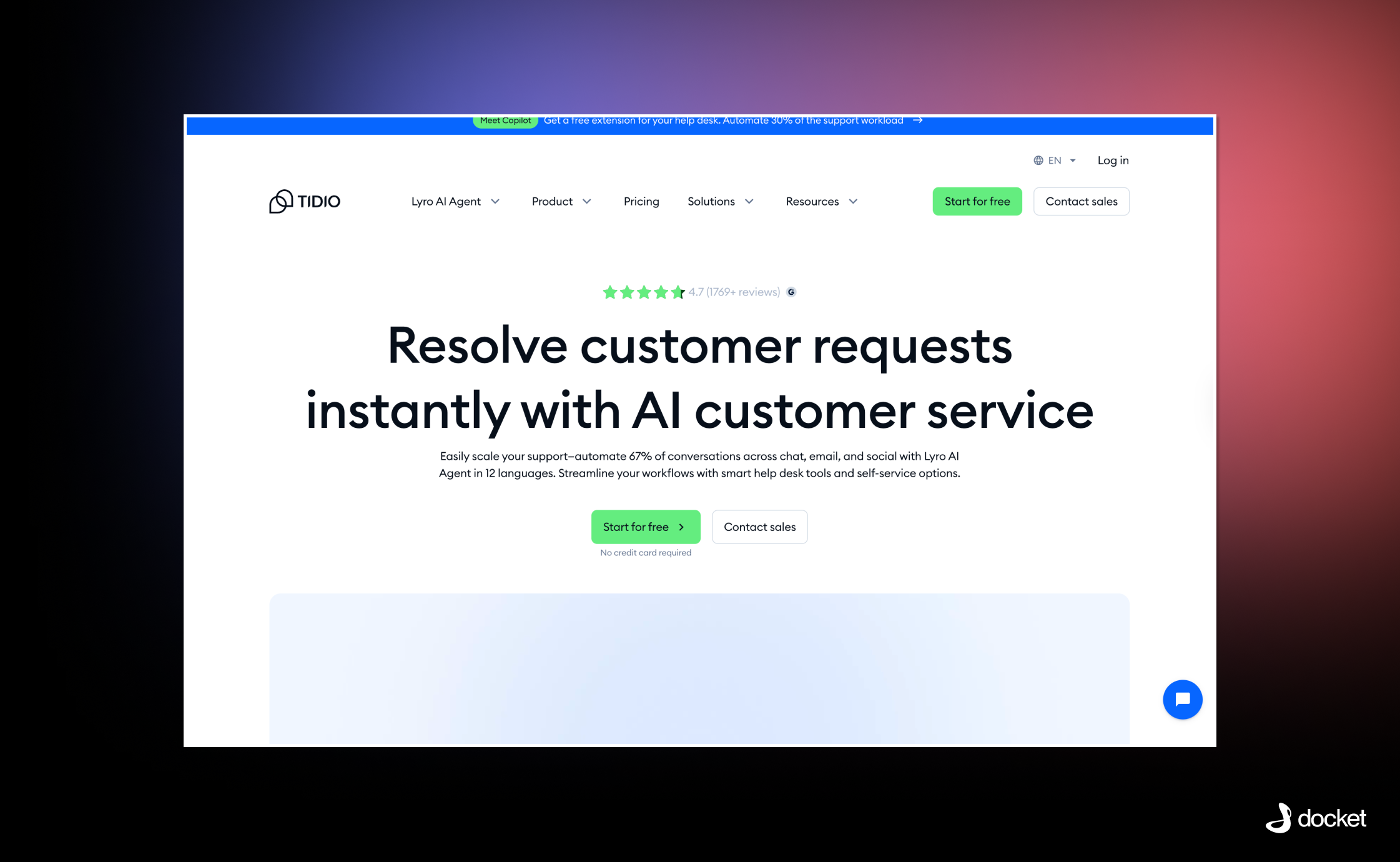
Tidio targets SMBs and e-commerce with live chat plus Lyro, an AI agent that resolves common questions. The product is simple to deploy and includes ready-to-use automation paths. Usage-based pricing gives you control if you forecast conversation volume well.
Differentiators
- Billing tied to billable human conversations and automation volume
- Lyro handles common issues, so agents focus on higher-value work
Pros
- Templates that speed up implementation
- Balanced feature set for small teams
Cons
- Forecasting is needed due to a usage-based model
- Less suited to complex enterprise workflows
Price
Starter from $24.17 per month billed annually for a base number of billable conversations, with automation add-ons available.
#10 tawk.to
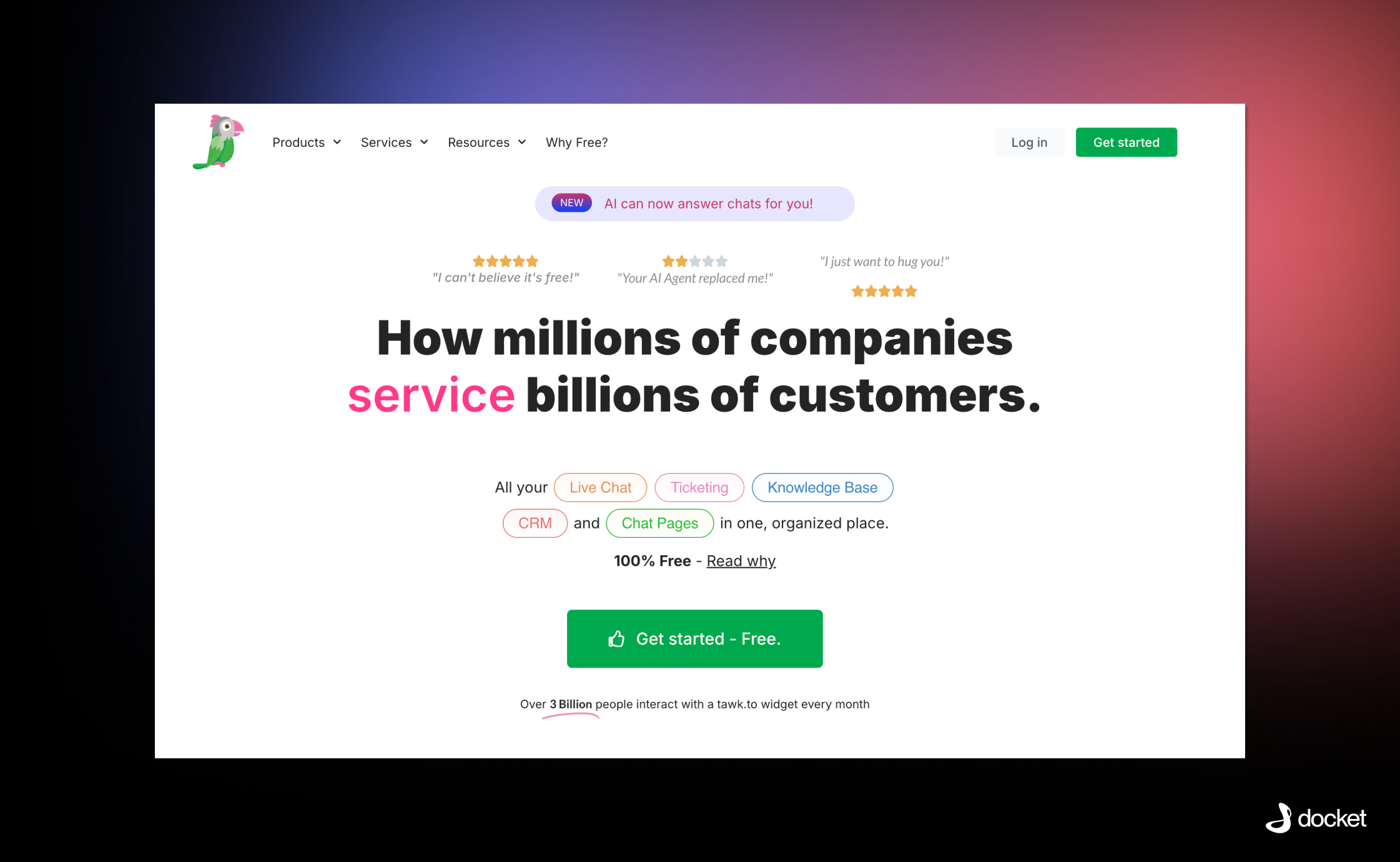
tawk.to offers a free live chat tool that many small businesses use to get started. It includes unlimited agents and chats with optional paid add-ons like AI Assist, video, voice, and even hired human agents if you need staffing. Teams that want to eliminate software costs often begin here.
Differentiators
- Free core product with unlimited agents and chats
- Add-ons for branding removal, AI, and staffing
Pros
- No software cost to launch
- Solid feature set for simple needs
Cons
- Advanced controls and branding removal require add-ons
- Fewer enterprise features than larger suites
Price
Core software is free. Add-ons and staffing are paid.
#11 Olark
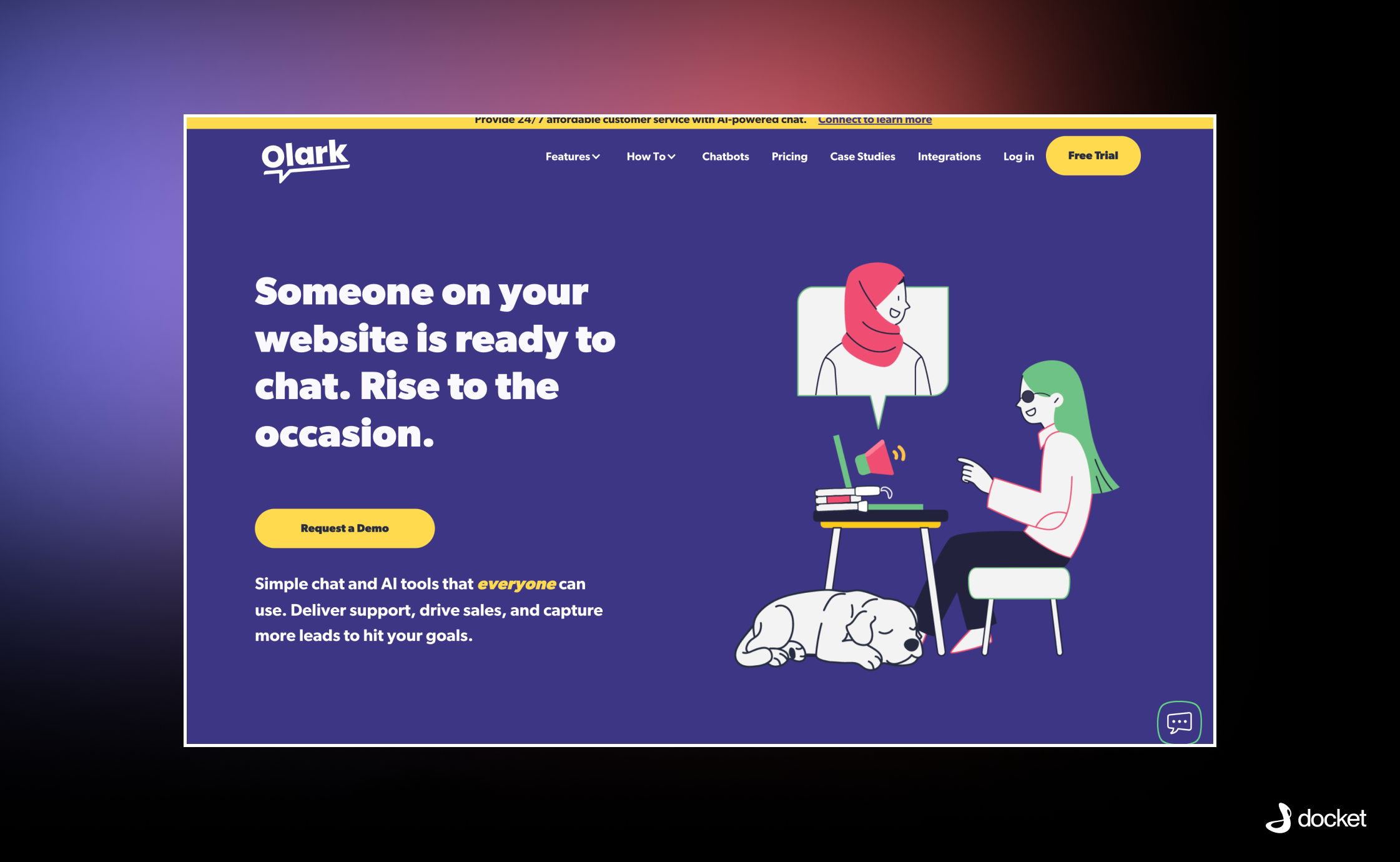
Olark keeps live chat simple with a clean operator interface and optional PowerUps for advanced tasks. It is easy to adopt for small teams that want dependable chat without a large platform. Accessibility features and straightforward pricing help non-technical teams succeed.
Differentiators
- Accessibility focus and live translation options
- PowerUps for co-browsing and other use cases
Pros
- Fast onboarding with minimal training
- Transparent per-seat pricing
Cons
- Fewer deep AI features than newer platforms
- Heavier automation usually needs add-ons
Price
The standard plan starts at $29 per seat per month. Pro adds AI and services.
Which is the right Drift alternative for you?
If you want an autonomous AI site agent that can actually sell and have a definite impact on your marketing pipeline and sales targets, start with Docket. It also serves as a comprehensive, robust solution that replaces Drift end-to-end.
If your chat requirement is for customer service and you need a complete help desk, consider Intercom or Zendesk.
If your team wants a free, simple chat that ties to CRM, HubSpot’s free option is a strong baseline.


